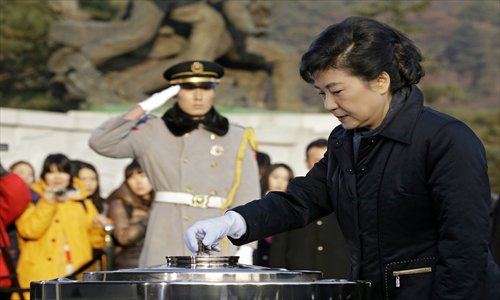Park offers 'limited' softness to N. Korea

South Korea's Ministry of Unification announced Wednesday that the country's parliament had approved a 9.1 percent rise in inter-Korean cooperation funds this year to 1.1 trillion won ($1.03 billion).
A spokesperson for the ministry said Seoul's offer for talks with Pyongyang is still open.
Days earlier, in an unusual nationally televised address on the New Year eve, North Korean leader Kim Jong-un called for an end to conflict with South Korea, saying that confrontation leads to nothing but war.
The increase of South Korean budget to fund North Korea-related projects and Kim's speech came as South Korean President Lee Myung-bak is to hand the presidency next month to President-elect Park Geun-hye, who pledged on the campaign trail that she would depart from Lee's hard-line North Korean policy and mend ties with the North.
Such moves are spurring renewed expectations that there will be a turnaround in inter-Korean relations under Park's presidency.
But analysts said although Park is likely to adopt a more flexible policy toward North Korea and push for reengagement once officially taking office in late February, she is unable to take any drastic measures to reverse the current government's position.
Middle ground
During the presidential campaign, Park sought to distance herself from Lee's hard line North Korea policy, although she and Lee belong to the same party.
"Talks with the North require no preconditions, and I can meet with North Korean leader Kim Jong-un if that can help improve inter-Korean relations," Park said during her election campaign, according to South Korea's Yonhap new agency.
Park also promised to dispatch a special envoy to the North and pledged to normalize inter-Korean ties through a "trust building process."
The conciliatory tone struck by Park is largely a natural policy adjustment in response to long domestic discontent on the impasse of inter-Korean relations over the years under Lee's presidency, said Lü Chao, director of the Korean Research Center at China's Liaoning Academy of Social Sciences.
"No matter who wins in the presidential race, he or she will not stick to Lee's old policies because they are aware that this would only lead to heightening tensions in the Korean Peninsula," Lü told the Global Times.
Lee reversed South Korea's failed decade of "sunshine policy" toward the North adopted under previous presidents Roh Moo-hyun and Kim Dae-jung who offered Pyongyang unconditional aid in order to persuade the North give up its nuclear ambitions.
Instead, Lee cut off almost all humanitarian aid and dialogue, demanding North Korea abandon its weapons program before restoring engagement.
"Park may use her personal advantages and experience to steer Seoul's approach toward Pyongyang in a more flexible direction and will try to find a middle ground between the sunshine policy and Lee's hard stance, both of which were much criticized at home," Lü said.
In 2002, Park paid a visit to Pyongyang as chairwoman of the Europe-Korea Foundation and met with late North Korean leader Kim Jong-il.
The division and conflict between the two Koreas also brought personal suffering to Park, whose mother was killed 38 years ago by a North Korean assassin who missed his real target, Park's father, then-President Park Chung-hee.
"National partition is a sorrow that touches all Koreans," Park said in a speech before the election, according to the Washington Post. "But for me it is brought to the fore by unimaginable personal suffering."
No essential difference
All the above factors could be reasons for Park to draw a line at maintaining Lee's North Korean policy and end intense inter-Korean confrontation. But analysts cast doubt over any essential difference between Park and Lee's stances, stressing that concerns over North Korea's new provocation will also bind Park' step.
Park's "trust building process" takes a softer tone as she indicates she will resume some cultural exchange and some sort of humanitarian aid to the North with no conditions.
But just like Lee' s policy, anything further is still based on the premise that Pyongyang must dismantle its nuclear weapons and apologize for the attacks on the South Korean Cheonan warship and the Yeonpyeong Island in 2010.
"The trust building process sounds very fresh and like a middle path, but actually it is not that different from Lee's stance," Hong Hyun-ik, a senior research fellow at the South Korea-based think-tank group Sejong Institute told the Global Times.
"Both Lee and Park see inter-Korean relations as that of 'debtor and creditor' and think it's a loss for North Korea if they shun improving the bilateral relationship," he said.
And denuclearization would not be an option for North Korea, experts said. "I don't think North Korea has any interest in going down this path," Mitchell Reiss, former US State Department policy planning director and President of Washington College, told the VOA.
North Korea's successful rocket launch in December will also limit the scope of action for Park's administration, especially when the UN Security Council has called for further international actions against Pyongyang.
"The rocket launch was a final blow, it would be difficult for Park to take any drastic measures for a while," Hwang Ji-hwan, international relations professor at the University of Seoul, told the Global Times.
Park has even pledged to beef up South Korea's nuclear and missile deterrence following North Korea's rocket launch.
"The new South Korean government will not do anything till all the process in the UN Security Council is finished," Hong said.
Agencies contributed to this story